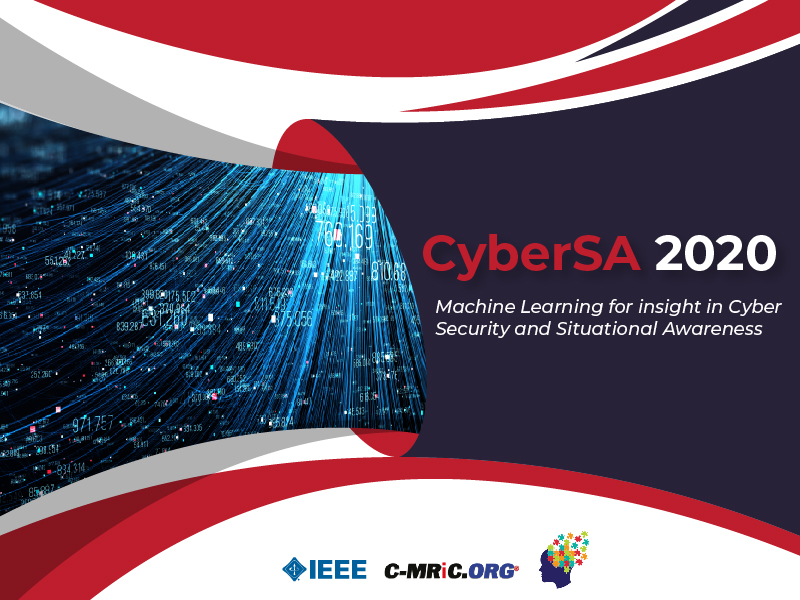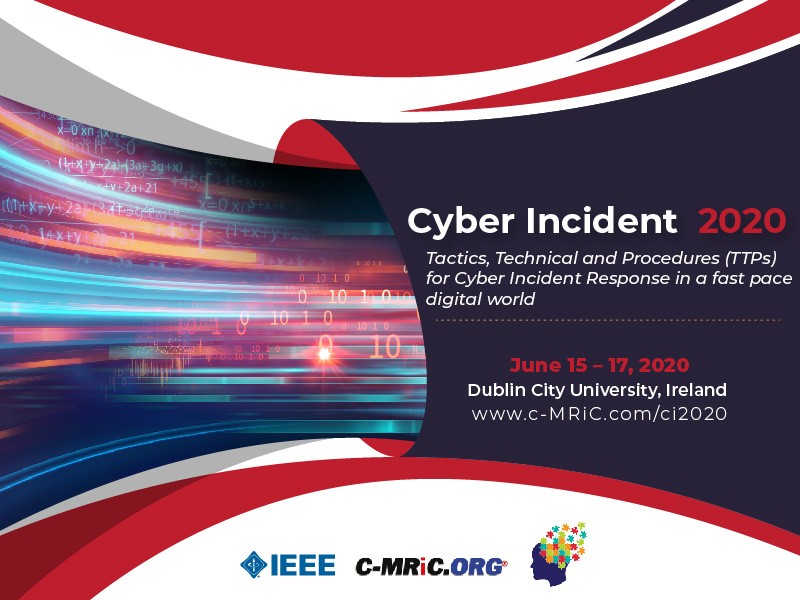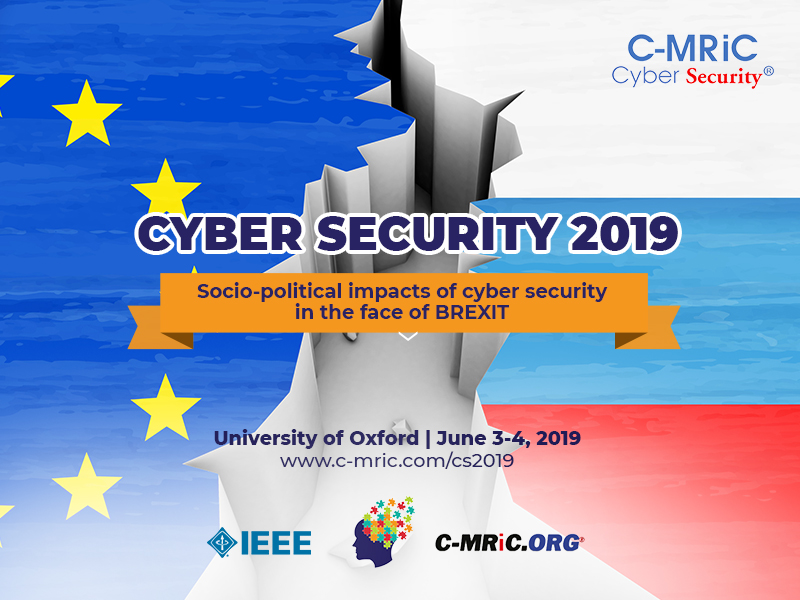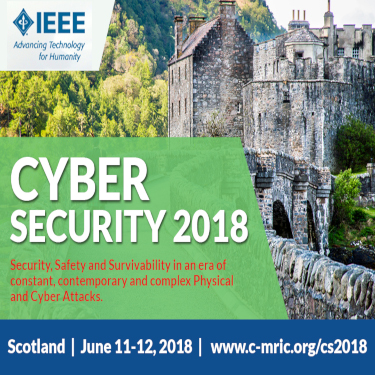
Theme: Advancing a multidisciplinary approach to Cyber Security.
Conference will be held online / virtual due to COVID19
Download Conference Programme
Download Conference Timetable
June 15 – 19, 2020
Call for Papers
IEEE is the Technical Co-Sponsor (TCS) of the International Conference on Cyber Security and Protection of Digital Services (Cyber Security 2020), an international refereed conference dedicated to the advancement of Cyber Security, information security, network security, application security and business transformation of digital services, and the protection of public digital services, especially high value bearing online services.
The aim of the Cyber Security 2020 is to encourage participation and promotion of collaborative scientific, industrial and academic inter-workings among individual researchers, practitioners, members of existing associations, academia, standardisation bodies, and including government departments and agencies. The purpose is to build bridges between academia and industry, and to encourage interplay of different culture.
Cyber Security 2020 invites researchers and industry practitioners to submit papers that encompass principles, analysis, design, methods and applications. All submitted papers are independently peer-reviewed. The conference is open to the public, so you can attend the event without presenting a paper. Registration for both authors and attendees (without presenting a paper) opens in March 2020. You are welcome!
The conference proceedings will be submittedfor consideration for publishing and listing on the following bibliographic indexes:
- IEEE Computer Society Digital Library
- IEEE Xplore Digital Library
- DBLP Computer Science, and
- Others – e.g. Scopus, CiteSeerX, Computer Science Index, EI Compendex, Academic Search Complete, CiteULike, Google Scholar & Microsoft Academic Search.
The organisers will accept registration of up to 5 IEEE UK&I Student and YP Members at 75% discounted rate, and will offer up to 20% registration discounts for all IEEE, BCS, IET & IISP members.
Details
Cyber Security 2020, in conjunction with the International Workshop on Secure Software Engineering in DevOps and Agile Development (SecSE 2020), is co-located with other conferences as part of Cyber Science 2020.
- Workshop on Secure Software Engineering in DevOps and Agile Development (SecSE 2020) will be presented at the conference.
- Posters & Presentations will be presented at the conference.
- Industry track is available for discussing and publishing pilot and proof of concepts.
- Work in Progress track is available for preliminary work.
- Research Ideas track is available for ideas in early stages assessment.
- PhD Seminar track is available for discussing and publishing early PhD thesis research.
BOOK NOW
Paper Submission
The deadline for all paper submissions, that is, both full papers and extended abstracts for Poster, WIP, PoC, Research Idea and PhD Seminar presentations was 26th January 2020, but now the deadline has been extended to 6th March 2020.
All Industry track, Work in Progress track, Research Ideas track and PhD Seminar track will be published in the conference proceedings. Interested participants, please submit your proposal using the online submission system hosted by Easychair Conference Portal.
Full paper submission should be via Easychair Conference Portal.
Online Submission
The online submission process is now open!
Please prepare your paper according to the formatting guidelines (Word document/PDF template/LaTeX). Use the IEEE A4 paper type. Please note that it’ll be IEEE e-copyright, which must be completed for all accepted papers. We’ll send authors’ of accepted papers instruction on how to complete an IEEE e-copyright form.
Authors must use the online submission systems hosted by EasyChair Conference System to submit their papers. Please use/download the IEEE A4 paper template, and specify which conference your submission is to. If you don’t have an EasyChair account you will need to create one and then login in order to submit your papers. Please read the Submission Instructions before submitting your work in the system.
Submission Instructions
Both long (8 pages max., roughly 8,000 words) and short (4 pages max., roughly 4,000 words) paper submissions should be written in English and be submitted electronically via the EasyChair conference portal. Submission file formats are PDF and Microsoft Word using the IEEE A4 Paper template that can be found at the corresponding C-MRiC website. Authors wishing to present a Poster, Industry Proof of Concept (PoC), Work in Progress (WIP), Research Ideas, or PhD Seminar may submit a 2‐page extended abstract using the online submission systems hosted by EasyChair Conference System, which, if accepted, will appear in the conference proceedings.
Topics of Interest
- Information Security
- Computer Network Security
- Application Security
- Web Services Security
- Mobile Security
- Protective Security
- Software Security
- Wireless & Sensor Network Security
- Software Coding Security
- Barcode Scanner Security
- Security in Middleware, Interface and Interaction
- Security Services in Authentication, Authorisation, Accountability, Automation, Availability, Integrity and Nonrepudiation
- Security Management
- Security Operations
- Digital Trust and Reputation
- Geographical Location (IP Geolocation) and Cyber Travel
- Geospatial Intelligence Networks (Centralised, Distributed & Hybrid)
- Policy, Legal, Legislation & Compliance
- Security Standardisation
- Law, Legal and Ethics
- Web Services
- Internet Banking
- E-Booking
- Cloud Computing
- E-Government
- Electronic Commerce
- Citizens Public Online Services
- Mobile Commerce
- E-Postal Services
- E-Health
- Online & Virtual Education
- E-Learning
- Web Chats
- Secure Protocols, Coding and Development
- Security Principles, Theory and Analysis
- Security Policy, Standards and Procedures
- Security in Business Processes
- Security Enforcing Function (SEF) Gateways
- Intrusion Detection Systems
- Intrusion Prevention Systems
- Firewalls
- Anti-Virus and Anti-Malware Gateways
- Data Loss Prevention
- Encryption Services
- Protection of Business Information Systems
- Protection of Online Services
- Public Online Services
- Internet Banking
- Security, Trust, Privacy
- Security in Online Gaming Systems
- Security in e-Government and Electoral Systems
- Content Security
- Protection of Public Online Content Distribution Systems
- Secure practices, processes and procedures in Public Online Services
- Cryptography – PKI, HSMs, Symmetric and Asymmetric Crypto, Crypto Custodian & Crypto Standards and Practices
- Digital Forensics and Investigations
- HoneyPots and Honey Nets
- Critical National Infrastructures (CNIs)
- Critical Network Systems (CNS)
- Cyber Security Operations Centre (CSOC)
- Joint Security Operations Centre (JSOC)
- Strategic Security Operations Centre (SSOC)
- Virtual Security Operations Centre (vSOC)
- Military Security Operations Centres (MSOC)
- SOC 2.0
- Cyber Science
- Cyber SOC Designs
- SOC Design Architecture Patterns
- Threat Intelligence
- Fusion Centre & Cyber Centre
- Operations Monitoring Centre
- Security Monitoring
- Transaction Monitoring
- Web Fraud Detection (WFD)
- Incident Management
- Cyber Incident Response
- Anomaly Detection
- Heuristic Learning
- Intrusion Detection
- Computer Misuse and Abuse
- Design Requirements
- Principles and Operations
- SOC Security Operating Procedures (SOC SyOPs)
- Architectures and Design Considerations
- Implementation of SOC Centres
- Monitoring and Security Analysis
- Security Information and Event Management (SIEM)
- Log Analysis & Analytics
- IDS/IPS & Firewall Administration
- Alerting and Event Prioritisation
- Log Management
- Analysis Tools and Techniques
- Incident Triage
- Incident Analysis, Management, Reporting and Escalation
- Management Reports and Management Information (MI) Reports
- Coordination and Containment
- Collaboration and Incident Investigation
- National CERT Liaison
- Model of Operations
- Intelligence Interfaces and Threat Intelligence Feeds
- Asset Management, Prioritisation and Categorisation
- Investigation & Forensic Readiness
- Functions of NOCs
- Design Principles
- Design Architectures and Design Requirements
- Monitoring and Analysis
- Coordination
- Incident Response & Handling
- Incident Management
- Operations Management
- Models of Operations
- System Interfaces and Automation
- Asset Management
- Data Leak Prevention (DLP)
- Denial and Distributed Denial of Service (DDoS)
- Vulnerability Scanning, Ranking and Prioritisation
- IT Health Checks (ITHC)
- Vulnerability Analysis
- Vulnerability Management
- Asset Management & Configuration Management Database
- Business Information Systems Management
- Asset Classification, Categorisation & Prioritisation
- Remedial Action Plans
- Risk Management
- Business Process Optimisation
- Security Management
- Policy and Standards Compliance
- Vulnerability Management
- Accreditation & Assurance
- Security Assurance and Certification
- Process, Procedure and Standardisation
- Global IT Outsourcing
- Supplier Management
- Autonomous & Self-driving
- Self-Healing
- Domestic Assistance
- Autonomous Healthcare and Assistance
- Industrial Manufacturing Robotics
- Search and Rescue Operations
- Cryptocurrency
- Bitcoin & Bit-everything
- Blockchain in Manufacturing
- Blockchain in Banking & Financial Systems
- Blockchain in Aviation
- Blockchain in Pharmaceuticals
- Blockchain in IoT
- Blockchain in Defence
- Blockchain in Cybersecurity Operations
- Blockchain in Publications
- Blockchain in Smart Contracts
- Blockchain in the Energy Sector & Utilities
- Cyber Security in childhood education
- Code – Teaching Coding for Kids, Teens and Colleges
- Secure by Code
- Secure by Design
- Secure by Default
- ACP
- Container Technologies
- Security Concerns Associated with Container Technologies
- Apps
- Cultural and Technical Processes for Managing Containers & Apps
- Microservices
- Kubernetes
- Docker
- Cloud Computing
- Virtualisation (Network, OS, Container & Apps)
- DevOps
- API
- HostOS
- Container Technology Architecture
- Approaches to Management, Maintenance and Processing of Containers, Apps and HostOS
- CI/CD
- Risks & Issues
- OWASP
- Open Web Application Security
Speakers
Important Dates
- Industry (Proof of Concept / Pilot) Submission –
January 26, 2020extended to March 6, 2020 - Extended Abstract (Work in Progress) –
January 26, 2020extended to March 6, 2020 - PhD Seminar Submissions –
January 26, 2020extended to March 6, 2020 - Research Ideas –
January 26, 2020extended to March 6, 2020 - Poster/Demo Submissions –
January 26, 2020extended to March 6, 2020 - Special Track Submissions –
January 26, 2020extended to March 6, 2020 - Workshops and Tutorials Submission –
January 26, 2020extended to March 6, 2020 - Full Paper Submissions –
January 26, 2020extended to March 6, 2020 - Notification of Full Paper/Abstract / Special Track Acceptance/Rejection –
March 26, 2020extended to April 17, 2020 - Camera Ready Paper Due –
April 14, 2020extended to May 8, 2020 - Participants Registration – March 26 – May 31, 2020
- Conference Date – June 15 – 19, 2020
Location
Moved to Online / Virtual
Programme Committee
- Cyril Onwubiko – Centre for Multidisciplinary Research, Innovation and Collaboration, UK
- Frank Wang – IEEE, United Kingdom and Ireland Computer Society
- Nick Savage – University of Portsmouth, UK
- Martin Gilje Jaatun – University of Stavanger, Norway
- Theo Lynn – Dublin City University, Dublin, Ireland
- Theo Lynn – Dublin City University, Dublin, Ireland
- Pierangelo Rosati – Dublin City University, Dublin, Ireland
- Grace Kenny – Dublin City University, Dublin, Ireland
- Patricia Endo – Universidade de Pernambuco, Brazil
- Xavier Bellekens – University of Strathclyde, Scotland, UK
- Per Hakon Meland – SINTEF, Norway
- Pierangelo Rosati – Dublin City University, Dublin, Ireland
- Joe Burton – Political Science and Public Policy Programme, The University of Waikato, New Zealand
- Phil Legg – University of the West of England, UK
- Kevin Curran – Faculty of Computing and Engineering, Ulster University, Northern Ireland, UK
- Carolina Nogueira – DISCO | Distributed Computer Systems Lab, Computer Science Department, TU Kaiserslautern, Germany
- Arnau Erola – Department of Computer Science, University of Oxford, UK
- Hanan Yousry Hindy – School of Design and Informatics, Abertay University, Dundee, Scotland
- Ngoc Tran – Dublin City University, Dublin, Ireland
- Arnau Erola – Cyber Security Centre, Department of Computer Science, University of Oxford, Oxford, UK
- Xavier Bellekens – University of Strathclyde, Scotland, UK
- Tim D Williams – University of Reading, Reading, UK
- Cyril Onwubiko – Centre for Multidisciplinary Research, Innovation and Collaboration, UK
- Thomas Pasquier – Department of Computer Science, University of Bristol, UK
- Francisco J Aparicio Navarro, Cyber Technology Institute, De Montfort University, UK
- Ensar Seker – NATO, CCD COE, Estonia
- Michal Chorasm – Telecommunications and Computer Science, University of Science and Technology (UTP), Bydgoszcz, Poland
- Kostas Kyriakopoulos – Digital Communications, Loughborough University, Leicestershire, UK
- Joe Burton – Political Science and Public Policy Programme, The University of Waikato, New Zealand
- He (Mary) Hongmei – AI and Cyber Security for Manufacturing, Cranfield University, UK
- Aunshul Rege – Temple University, Pennsylvania, USA
- Jason Nurse – University of Kent, UK
- David Brosset – Naval Academy Research Institute, France
- Uwe Glässer – School of Computing Science, Simon Fraser University, Canada
- Jens Myrup Pedersen – University of Aalborg, Denmark
- Marios Anagnostopoulos – University of the Aegean, Greece
- Uri Blumenthal – MIT Lincoln Laboratory, MIT, USA
- Ciza Thomas – College of Engineering, India
- Stefanos Gritzalis – University of the Aegean, Greece
- Varun Dutt – Indian Institute of Technology Mandi, India
- Georgios Kambourakis – University of the Aegean, Greece
- Elisavet Konstantinou – University of the Aegean, Greece
- Antonis Mouhtaropoulos – Department of Computer Science, University of Warwick, Coventry, UK
- Kevin Curran – Faculty of Computing and Engineering, Ulster University, Northern Ireland, UK
- Eliana Stavrou – Computing Department, UCLan Cyprus, Larnaca, Cyprus
- Tim D Williams – University of Reading, Reading, UK
- Amin Hosseinian-Far – Business Systems and Operations , University of Northampton, UK
- Zisis Tsiatsikas – University of the Aegean, Karlovassi, Greece
- Michalis Diamantaris – Institute of Computer Science, Foundation for Research and Technology (FORTH), Greece
- Jorge Varela Barreras – Oxford Research Staff Society Engineering Science, University of Oxford, UK
- Avishek Nag – University College Dublin, Ireland
- Elochukwu Ukwandu – University of Strathclyde, Scotland, UK
- Egon Kidmose – Aalborg University, Denmark
- Bertrand Venard – Audencia, OII, University of Oxford, UK
- Carlos A. Perez Delgado – School of Computing, University of Kent, UK
- Philipp Reinecke – Cardiff University, Wales, UK
- Thomas T Y Win – School of Business & Technology, University of Gloucestershire, UK
- Suleiman Yerima – Cyber Security, De Montfort University, UK
- Lynsay Shepherd – Abertay University, Dundee, Scotland, UK
- Florian Skopik – Cyber Security Research, AIT Austrian Institute of Technology, Austria
- Palvi Aggarwal – Carnegie Mellon University (CMU), USA
- Sean Mckeown – Edinburgh Napier University, Scotland, UK
- Arghir-Nicolae Moldovan – National College of Ireland (NCIRL), Ireland
- Domhnall Carlin – Queen’s University (QUB), Belfast, Northern Ireland, UK
- Karen Renaud – Abertay University, Scotland, UK
- Maria Bada – University of Cambridge, UK
- Kim Tam – Plymouth University, UK
- Felix Heine – Hannover University of Applied Sciences, Germany
- Ruth Ikwu – Cardiff University, Wales, UK
- Kumar Bandeli – Data Science, Walmart Inc., USA
- Charles Clarke – Kingston University, London, UK
- Varun Dutt – Indian Institute of Technology (IIT) Mandi, India
- Filippo Sanfilippo – University of Agder, UIA, Norway
- Nicholas Savage – Portsmouth University, UK
- Egon Kidmose – Aalborg University, Denmark
- Ivan Silva – Instituto Metrópole Digital (IMD), Federal University of Rio Grande do Norte (UFRN), Brazil
- Frank Wang – Kent University, UK
- Vanderson de Souza Sampaio – Fundação de Medicina Tropical Dr. Heitor Vieira Dourado, Brazil
- Ryan Heartfield – Cyber Security, University of Greenwich, London, UK
- Lakshmi Prayaga – Department of Applied Science, Technology and Administration, University of West Florida, USA
- Harin Sellahewa – School of Computing, The University of Buckingham, UK
- Thaddeus Eze – Computer Science Department, University of Chester, UK
- Dimitris Kavallieros – Center for Security Studies (KEMEA), Greece
- Susan Rea – Nimbus Centre at Cork Institute of Technology, Ireland
- Samir Puuska – JAMK University of Applied Sciences, Finland
- Vasil Vassilev – School of Computing, London Metropolitan University, UK
- Martin Gilje Jaatun – University of Stavanger, Norway
- Ulrik Franke – Systems Engineering, RISE Research Institutes of Sweden, Sweden
- Shamal Faily – Cyber Security Research group (BUCSR), Bornemouth University, UK
- Jingyue Li – Department of Computer Science, Faculty of Information Technology and Electrical Engineering, NTNU, Norway
- Hasan Yasar – Division of the Software Engineering Institute, Carnegie Mellon University, USA
Conference Programme
- Martin Gilje Jaatun, Lars Bodsberg, Tor Olav Grøtan and Marie Moe. An Empirical Study of CERT Capacity in the North Sea
- Andrew Rae and Asma Patel. Developing a security behavioural assessment approach for cyber rating UK MSBs
- Uchenna Daniel Ani, Hongmei He and Ashutosh Tiwari. Vulnerability-Based Impact Criticality Estimation for Industrial Control Systems
- Inger Anne Tøndel, Ravishankar Borgaonkar, Martin Gilje Jaatun and Christian Frøystad. What Could Possibly Go Wrong? Smart Grid Misuse Case Scenarios
- Xiaoyu Du, Quan Le and Mark Scanlon. Automated Artefact Relevancy Determination from Artefact Metadata and Associated Timeline Events
- Enoch Agyepong, Yulia Cherdantseva, Philipp Reinecke and Pete Burnap. Towards a Framework for Measuring the Performance of a Security Operations Center Analyst
- Waleed Alghamdi and Michael Schukat. Slave Clock Responses to Precision Time Protocol Attacks: A Case Study
- Daniel Reti, Daniel Fraunholz, Janis Zemitis, Daniel Schneider and Hans Dieter Schotten. Deep Down the Rabbit Hole: On References in Networks of Decoy Elements
- John Oraw and David Laverty. Restricting Data Flows to Secure Against Remote Attack
- Hanlin Chen, Hongmei He and Andrew Starr. An Overview of Web Robots Detection Techniques
- Joel Chacon, Sean McKeown and Richard Macfarlane. Towards Identifying Human Actions, Intent, and Severity of APT Attacks Applying Deception Techniques – An Experiment
- Gwyn Wilkinson and Phil Legg. “What did you say?”: Extracting unintentional secrets from predictive text learning systems
- Pascal Faurie, Arghir-Nicolae Moldovan and Irina Tal. Privacy Policy – “I agree”?! – Do alternatives to text-based policies increase the awareness of the users?
- Aikaterini Kanta, Iwen Coisel and Mark Scanlon. Smarter Password Guessing Techniques Leveraging Contextual Information and OSINT
- Joshua Sipper. Cyber Threat Intelligence and the Cyber Meta-Reality and Cyber Microbiome
- Andrew McCarthy, Benedict Gaster and Phil Legg. Shouting Through Letterboxes: A study on attack susceptibility of voice assistants
- Sean McKeown and Gordon Russell. Forensic Considerations for the High Efficiency Image File Format (HEIF)
- Clemens Krueger and Sean McKeown. Using Amazon Alexa APIs as a Source of Digital Evidence
- Marco Cook, Ioannis Stavrou, Sarah Dimmock and Christopher Johnson. Introducing a forensics data type taxonomy of acquirable artefacts from programmable logic controllers
- Joshua Talbot, Przemek Pikula, Craig Sweetmore, Samuel Rowe, Hanan Hindy, Christos Tachtatzis, Robert Atkinson and Xavier Bellekens. A Security Perspective on Unikernels
- Tolga Ünlü, Lynsay Shepherd, Natalie Coull and Colin McLean. A Taxonomy of Approaches for Integrating Attack Awareness in Applications
- Martin Fejrskov, Emmanouil Vasilomanolakis and Jens Myrup Pedersen. Cyber-security research by ISPs: A NetFlow and DNS Anonymization Policy
- Andrei Queiroz, Brian Keegan and Susan Mckeever. Moving Targets: Addressing Concept Drift in Supervised Models for Hacker Communication Detection
- Pranshu Bajpai and Richard Enbody. Memory Forensics Against Ransomware
- Pranshu Bajpai and Richard Enbody. An Empirical Study of Key Generation in Cryptographic Ransomware
- Felix Anda, Brett Becker, David Lillis, Nhien-An Le-Khac and Mark Scanlon. Assessing the Influencing Factors on the Accuracy of Underage Facial Age Estimation
- Jonathan Francis Roscoe and Max Smith-Creasey. Acoustic Emanation of Haptics as a Side-Channel for Gesture-Typing Attacks
- Fadi Sibai. AI Crimes: A Classification
- Yunjia Wang, Yang Liu, Tiejun Wu and Ishbel Duncan. Cost-Effective OCR Implementation to Prevent Phishing on Mobile Platforms
- Nebrase Elmrabit, Feixiang Zhou, Fengyin Li and Huiyu Zhou. Evaluation of Machine Learning Algorithms for Anomaly Detection
- Joseph Kaberuka and Christopher Johnson. Adapting STPA-sec for Socio-technical Cyber Security Challenges in Emerging Nations: A Case Study in Risk Management for Rwandan Health Care
- Lukas Gressl, Michael Krisper, Christian Steger and Ulrich Neffe. Towards Security Attack and Risk Assessment during Early System Design
- Evangelos Moustakas, Nishtha Lamba, C Ranganathan and Dina Mahmoud. Blurring lines between fiction and reality: Perspectives of experts on marketing effectiveness of virtual influencers
- Katia Raya, Nicole D’Almeida and Maroun Chamoun. Social big data: A Twitter text mining approach to the communication of universities during the Lebanese protests
- Matthew Spradling, Jeremy Straub and Jay Strong. Introducing & Evaluating `Nutrition Facts’ for Online Content
- Tapadhir Das, Abdelrahman Eldosouky and Shamik Sengupta. Think Smart, Play Dumb: Analyzing Deception in Hardware Trojan Detection Using Game Theory
- Timothy D. Williams. Epistemological Questions for Cybersecurity
- Théo Simon and Bertrand Venard. Technical codes’ potentialities in cybersecurity. A contextual approach on the ethics of small digital organizations in France.
- Bertrand Venard. Privacy Protection Behaviours: a diversity of individual strategies
- Jordan Schoenherr and Robert Thomson. Insider Threat Detection: A Solution in Search of a Problem
- Sebastião Rogério da Silva Neto, Thomás Tabosa de Oliveira, Vanderson de Souza Sampaio, Theo Lynn and Patricia Takako Endo. Platform for monitoring and clinical diagnosis of arboviruses using computational models
- Arman Zand, James Orwell and Eckhard Pfluegel. Secure Framework for Anti-Money-Laundering using Machine Learning and Secret Sharing
- Drew Malzahn, Zachary Birnbaum and Cimone Wright-Hamor. Automated Vulnerability Testing via Executable Attack Graphs
- Christopher Kelly, Nikolaos Pitropakis, Sean Mckeown and Costas Lambrinoudakis. Testing And Hardening IoT Devices Against the Mirai Botnet
- Johannes Mols and Emmanouil Vasilomanolakis. ethVote: Towards secure voting with distributed ledgers
- Tharindu Ranathunga, Ramona Marfievici, Alan McGibney and Susan Rea. A DLT-based Trust Framework for IoT Ecosystems
Related Conferences:

Cyber SA 2020
IEEE is the Technical Co-Sponsor (TCS) of the International Conference on Cyber Situational Awareness, Data Analytics and Assessment (Cyber SA 2020).
View More
Social Media 2020
IEEE is the Technical Co-Sponsor (TCS) of the International Conference on Social Media, Wearable and Web Analytics (Social Media 2020).
View More
Cyber Incident 2020
IEEE is the Technical Co-Sponsor (TCS) of the International Conference on Cyber Incident Response, Coordination, Containment & Control (Cyber Incident 2020).
View More









